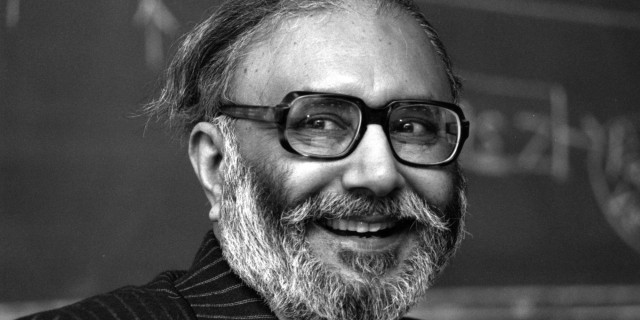Abdus Salam’s death anniversary passes by without mention
Not a single event organised to commemorate scientist’s legacy

15th October 1979: Joint Nobel Physics prize winner and Imperial College of London professor Abdus Salam, originally from Pakistan. (Photo by Keystone/Getty Images)
The great scientist passed away on November 21, 1996 in Oxford, United Kingdom but not a single ceremony has ever been organised to commemorate his death or praise his contributions in the field of science.
'Every child should be told about Abdus Salam'
Though the federal government set up the Dr Abdus Salam Chair at GCU in 1999, the staffers have been awaiting permanent appointments since. They are usually hired on one- or two-year contracts.
Dr G Murtaza was nominated as the Salam Professor for the chair in 2000. Apart from the assistant professor, two research officers, two post doctoral fellows, one assistant and an attendant are working with the chair.
Dr Murtaza told The Express Tribune that the department had actually planned a three-day Abdus Salam symposium for November 21, 22 and 23 but it had to be put off because of the holiday announced in Lahore owing to Imam Hussain’s Chehlum.
No other mentions
Besides the GCU, no other event has been planned for the scientist’s death anniversary. Punjab University spokesperson confirmed the varsity had never organised any conference on Dr Abdus Salam.
The Jamaat-e-Ahmadiyya spokesperson believes the great physicist has been discriminated against only because of his religious beliefs. Dr Salam belonged to the minority Ahmadiyya community.
Spokesperson Saleemudin told The Express Tribune that being an Ahmadi, Dr Salam faced this discrimination in his life that continued afterwards as well. “He was a hero for Pakistan. But I have never seen his portraits along with other national heroes put up on national days,” he added.
Dr Abdus Salam and all the wrong choices Pakistan made
Official neglect
Dr Salam’s 400-square-foot house comprising two rooms in Mohalla Dawood Nahar in Jhang Tehsil was declared a national monument in 1981. This is the house where the physicist was born in 1926.
“There have never been any commemorative ceremonies for Dr Salam at this house as long as I have lived here,” one of the neighbours Nadeem says. A signboard outside the house states the property is protected under the Antiquities Act, 1975.
Nadeem said the outer wall of the house fell some time ago and was repaired by neighbours before the archaeology department took the property into its custody and deputed a caretaker for the site.
The keys to the house remain with another neighbour Yasir, who opens the house for occasional visitors. Reportedly, the caretaker visits once or twice a month. The house needs repairs but the archaeology department and government seem to have no such intentions.
Journey to success
Dr Salam won a scholarship to Government College, University of Punjab and completed his MA in 1946. He then won a scholarship at St John’s College, University of Cambridge where he excelled in mathematics and physics.
In 1950, the Cambridge University awarded him for the most outstanding pre-doctoral contribution to physics. He obtained a PhD in theoretical physics and his thesis, published in 1951, contained fundamental work in quantum electrodynamics which had already gained him an international reputation.
Victim of discrimination
Dr Salam returned to Pakistan from England in 1951 to teach mathematics at Government College, Lahore. In 1952, he was appointed head of the mathematics department of Punjab University. He left Pakistan for Europe in protest against state-sanctioned discrimination and in 1979 he was awarded the Nobel Prize for his groundbreaking research in theoretical physics.
When Dr Salam travelled to Pakistan in December 1979, he was received in Lahore, Peshawar and Islamabad by the military secretaries to the governors and then president Ziaul Haq. When protesters from a politico-religious party threatened to disrupt a commemorative event at Islamabad’s Quaid-e-Azam University, the institution was compelled to shift the event to the National Assembly Hall.
Similarly, protests by Islami Jamiat Talaba disrupted an event at Punjab University, therefore Dr Salam’s alma mater Government College, Lahore chose not to invite him to the institution.
Dr Salam passed away in 1996 and was buried in Rabwah without a state funeral. The epitaph at his grave reads ‘First Nobel Laureate’ as the word ‘Muslim’ has been deleted on court orders.
Published in The Express Tribune, November 22nd, 2016.



















COMMENTS
Comments are moderated and generally will be posted if they are on-topic and not abusive.
For more information, please see our Comments FAQ